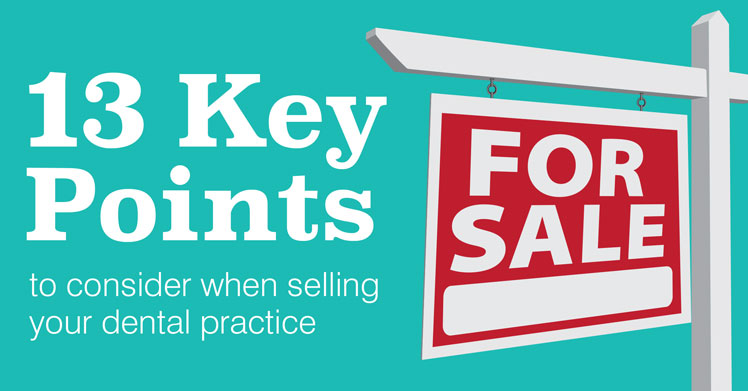Selling your dental practice is a big decision and it requires as much planning as time will allow. Therefore, it’s vital that you make sure that the fundamentals are in place to ensure the sale goes smoothly and is a success.
Lis Hughes of Frank Taylor & Associates takes a look at 13 key points to consider when selling your dental practice, and why, if you are a private practice with a patient plan, you might already be one step ahead of the game…
For the most effective results we often suggest that you start thinking about your exit strategy at least two or three years before a sale may even take place. There are a number of things that can be changed and improved upon to make the sale go more smoothly with a wider selection of buyers.
13 key points to consider when selling your dental practice:
1. A well maintained patient plan
Very high on the list of priorities for a potential buyer is a well-maintained patient plan.
When selling a dental practice, it has three key benefits:
- A dental practice with a plan is simply more attractive to the institutions that are likely to be lending to the buyer. Regular cash flow is a must in any business and dentistry is no different.
- Good plan providers offer regular marketing support, meaning that there are less likely to be gaps in the appointment book
- A principal who has taken on a plan will probably have given some time to looking at the dental practice in a more business-minded sense. Therefore, one would hope that the all-important numbers will bear this out
2. Your finances must be up-to-date
When banks are considering lending to potential buyers, they require the last three years’ management accounts and, if appropriate, the last three months’ NHS schedules. The most recent accounts must be no older than nine months from the previous year end.
3. The dental practice should be well run with potential for future growth
Buyers will want to see a patient list that has been and continues to grow steadily. (I am sure that a plan will have been of assistance with patient loyalty here.)
4. Associate contracts
Do you have written contracts with associates or are you still working to a verbal agreement? These need to be written and completed before any sale.
5. Record-keeping
Leading on from the last point, all contracts such as employment, service, overheads, etc need to be present and correct. Dare I also raise the dreaded CQC, and yes, all registration documentation will need to be complete.
6. The ‘kerbside test’
Go outside and take a look – perhaps take a trusted friend with you? Would you buy the practice? If not, then take the time to fix what is putting you off the purchase – if you wouldn’t buy it then it is quite likely that neither would anyone else.
7. Use an agent
In the initial stages make sure that the sale is conducted by an agent so that you remain anonymous. This will allow you to then only speak to buyers who have a genuine interest in purchasing the business.
[blockquote cite=”Lis Hughes” type=”center”]A dental practice with a plan is simply more attractive to the institutions that are likely to be lending to the buyer. Regular cash flow is a must in any business and dentistry is no different.[/blockquote]
8. Whatever you do, do not tell the PCT that you intend to sell the practice
They may be very amiable and sound like they want to help you but they may come back and try to renegotiate your terms at a later stage. In fact, keeping things fairly close to your chest is a good idea all round.
9. Chuck out the chintz!
If you have redundant or non-working equipment then get rid of it.
10. Be prudent
Whilst the internal surroundings should be pleasant and not put off a potential purchaser, this is the sale of a business, not a home. There is no need to spend thousands on a practice makeover, although a lick of paint wouldn’t go amiss.
11. Make sure that you keep your options open
Some buyers may not want the freehold and that could still be a good option. Typically, most buyers would expect a remaining practice lease of a minimum of 10 years (ideally 15 and even better if 20).
12. Go to the whole market
Once the practice is on the market it is quite likely that you will receive phone calls from corporate companies (and others) offering to buy the practice. The way to ensure the best possible selling price is to go to the whole market. Some will suggest that only they are interested in your practice – do not believe them.
13. Take the best independent advice
Whether it be in regard to finance, solicitors, IFA, etc, make sure that you deal with specialists. In terms of an agent, make sure that they are independent and only working in your interests. (Many can take a commission from both buyer and seller, this is really unsatisfactory due to a conflict of interest.)
—
Frank Taylor & Associates have been involved in the sales and valuation of thousands of dental practices nationwide due to their depth of experience and strong business ethic.
For more information, visit www.ft-associates.com
[mc4wp_form]
